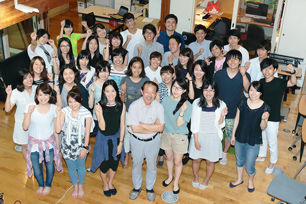Katsuhiko Ogawa, Professor, Faculty of Environment and Information Studies
Honing Curiosity and Nurturing Individuality
From RIAJU* to non-RIAJU, 40 warm and friendly students from first-year undergraduate students to doctoral students gather in my seminar class, which values unique ideas regardless of their age differences.

At the Ogawa Lab, in order to realize new media involving various everyday situations, we implement human-centered design, which is to design user-centered media, and to evaluate and improve them through field tests.
However, even when I am asked about my expertise, it has recently become quite difficult to explain. This is because a lot of the research conducted in our lab cannot be covered by conventional fields.
Some of the main graduation thesis topics from the last two years include: “funbrella” that makes rainy days exciting, a movie of a shopping district from a dog’s eye view, otome game [dating sim for women], the quality of television viewing according to Twitter, manzai [comic dialogue] with a mannequin, and train radio.
The reason for so much unique research is because of the policy of our class, which is as follows:
1. Students are to study whatever they want, 2. No matter how small it is, they must try to conduct original research, and 3. When facing difficulties, I am available to help. Furthermore, this research is not confined to the university. Not only has a lot of it been presented academically at international and academic conferences, but some also lead to collaborations with different corporations and government organizations. As a result, some of the students have received awards at academic conferences or have been adopted as a new service for a company. Students’ activities are really dynamic.
Since my lab has been like this for years, I’m starting to get confused about my own research. However, I love this chaotic environment. There are many things to learn from my students, and because of that I can enjoy having discussions with them, and I can always keep my brain young.
In fact, the SFC brochure, as well as educational materials for preparatory schools, encourages students to identify a problem and to find a solution on their own. At the Faculty of Engineering, where I graduated from, my teacher told me I should study whatever I want, and I chose to study control theory. My fascination with this research has led to what I do today. Although times as well as research have changed, I hope Keio University students will continue to value the spirit of “independence and self-respect.”
*RIAJU: This is a portmanteau of the Japanese words “RIARU” [real] and “JUJITSU” [fulfillment], and it refers to a person leading a fulfilling life in the real world. A RIAJU is a person satisfied with his or her real life.
Student's Voices
Emiri Morishita
Third-year student, Faculty of Policy Management
A lab in which everyone can find solutions to problems in a lively and spirited manner
The appeal of Professor Ogawa’s lab is that everyone conducts research in a lively manner. We all seriously confront the problems that we want to solve, come up with unique solutions, and then put them into practice. One reason that makes this possible is the motto of the class, which is “With spirit, with enjoyment, and with vigor.” Our teacher always says that there is nothing that cannot be a research subject, and he encourages us to create something that we really want, which is the basis of creation. Also, another point is that people with diverse experiences gather in our class. There are many occasions in which we present ideas in groups, and every time we do, an interesting idea that could not be thought up alone is born. I believe this environment is at the basis of the vibrant research by the students in this class.
*Position titles, etc., are those at the time of publishing.
